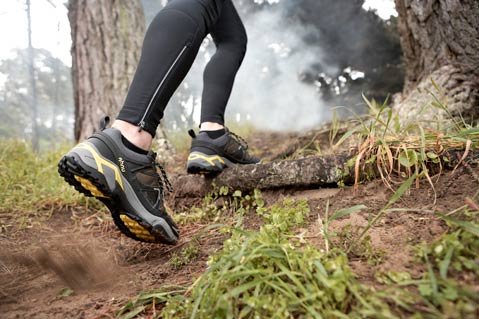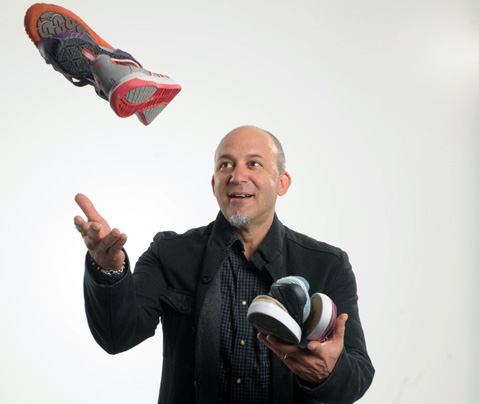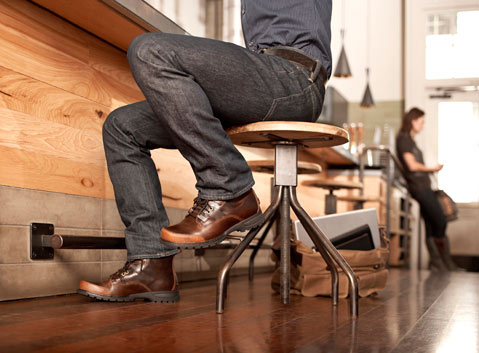Diamonds on the Soles of Their Shoes
From the Heart of Goleta, Deckers Outdoor Corp Readies to Take Over the World

Let the record show: Great things get born in Isla Vista.
It was there, in that surfy, student-stuffed, and party-minded suburb of UC Santa Barbara, that the South Coast’s only resident billion-dollar business, Deckers Outdoor Corporation, was conceived nearly four decades ago. Hatched in 1973 as a flip-flop company by two freshly minted Gaucho alums who were seeking “professional” means to more beach time — one being a surfer, the other a beach volleyballer — the company has grown into a certifiable and celebrated footwear behemoth, with offices and employees all over the world, multimillion-dollar profits each and every fiscal quarter for the past four years and counting, an award-decorated reputation as one of the best and most fun places to work in America, and a new sprawling, state-of-the-art corporate headquarters slated to open on 13 acres in the heart of Goleta’s Cabrillo Business Park in 2013.
Just last week, on the most recent episode of CNBC’s Mad Money, host Jim Cramer — who has long been a fan of Deckers’s fiscal prowess during his nationally televised investment-advice rants — declared the company one of five in the country that you can count on during these economically sorry times. Even with today’s $106-per-share price tag on the New York Stock Exchange, Cramer exclaimed, “I think they are still a real bargain — with plenty of room to run.”
The Creation Myth
As origin stories go, Deckers’s is as classically Santa Barbara-esque as possible. College buddies Doug Otto (the surfer) and Karl Lopker (the volleyballer) started making flip-flops as their UCSB days were coming to a close; the former handled sales and distribution, and the latter was in charge of manufacturing. Back then, flip-flops were an item of easy disposal, typically picked up at the drugstore for less than a dollar and worn until they disintegrated on your feet a short time later. But Otto and Lopker wanted to make a more durable option for the free-toe and -heel enthusiasts of the world, so they stacked different layers of rubber on top of each other and convinced surf shops in California and Hawai‘i to carry them.
At first, the easy-breezy and purposely rugged slip-on sandals were known as “Driftwood Dans.” But during a business/surf trip to Hawai‘i in 1975, Otto heard his shoes called “deckas,” a slang phrase referring to the sandals’ stacked appearance, which reminded the islanders of the skinny wood planks that made up skateboard decks. So “Driftwood Dans” became “Deckers,” and as the surf industry exploded throughout the 1970s and early ’90s, a little flip-flop company from I.V. rode the same wave to success.
In 1982, Otto bought out Lopker, who had recently cofounded the software company QAD, and began plotting what came next. But instead of inventing more shoes, Otto decided to do what would become Deckers’s calling card in the years to come: license another company’s footwear and then manufacture and distribute it through its established network of retailers. So in 1985, Deckers partnered with Teva — the world’s first sport sandal, created by a Colorado river guide named Mark Thatcher — and both companies exploded, with Teva enjoying sales levels through the late 1980s and early ’90s that essentially doubled every year.
In 1993, Deckers decided to go public on NASDAQ, and because of the way the family-first company was vested, that meant quite a payday for many longtime employees, no matter how high or low they were on the corporate totem pole. That same year, Deckers acquired Simple Shoes (perhaps the first shoe label to make “going green” a priority), and then, in 1995, the company made its most brilliant and lucrative business maneuver to date by acquiring UGG Australia, the sheepskin boot maker that’s done nothing but grow in popularity since then.
With a trio of successful lifestyle-oriented footwear companies flying under the Deckers family flag, Otto and the rest of the Deckers crew decided in the mid 1990s to “retire” the Deckers flip-flop brand and focus on growing the new members of the team. Deckers Outdoor Corporation was officially formed, and with their flag still firmly staked in Goleta, a new chapter of sorts began.

New Leader, Same Vision
“All I have done is just build on the foundation that was already here,” said Deckers CEO Angel Martinez on a recent Friday afternoon from Decker’s current command central on Fairview Avenue near the Santa Barbara Airport. “Really, I have only two fundamental jobs — keeper of the vision and keeper of the culture.”
A legend in the world of footwear, Martinez took the helm at Deckers in 2005 after CEO stints at Rockport and Keen shoe companies, not to mention a critical role at Reebok, where he launched the company’s first women’s aerobic shoe line. (Of his time at Reebok, Martinez matter-of-factly explained, “I came from a company that went from a zero-dollar operation to a $3.5-billion business, and I was there every step of the way.”) At 55 years young, the former competitive distance runner is a dark, handsome, goateed, and visibly confident man who oozes a demanding sort of inspiration, even after only a few minutes in his presence. He’ll say things like “I’m not a fan of fear; you can’t live with it, and you have to eliminate it from the workplace,” “I believe you invent your own future,” and “A great company is not about the sales; it is about the people,” and you cannot help but believe him. Better yet, his employees do, too, and, well, the results of his methods are undeniable.
Martinez came to Deckers at a time when the company was, in his words, “stuck in start-up mode.” Thanks to early profits from Teva and the booming sales of UGG, Deckers was a $200-million business whose board of directors was eyeing $500 million but whose management was unsure of how to get there. In just more than six years, Martinez’s leadership not only eclipsed the half-billion mark but managed to double it — and then some.
Led by the world’s unwavering love of the cozy-on-the-inside, tough-on-the-outside UGG line — which will probably top $1 billion in sales this year alone — and the reimagined identity of Teva, Deckers continues to grow in all corporate ways possible. The company employs more than 1,000 people at offices from Paris and London to Tokyo and Hong Kong, including 300-plus at their headquarters in Goleta. It’s added new brands to the family tree, such as Mozo (a line of sexy but functional shoes for people who spend most of the day on their feet) and Sanuk (a well-established surf-rooted shoe from Orange County that sets comfort and fun-flavored individuality as its priorities), so that seven uniquely different footwear businesses are now part of its stable. (Simple Shoes, however, will be retired at the end of 2011.) Deckers is also about to launch a completely retooled Web site at Deckers.com, which will work to introduce its full family of shoes to the world while also highlighting the overarching company ethos of working hard, playing hard, and making family a priority.

But perhaps nothing explains the company’s success better than this week’s groundbreaking of the new 140,000-square-foot global headquarters in the Cabrillo Business Park near the corner of Los Carneros and Hollister Avenue in Goleta. While a less-than-one-percent employee turnover rate and three straight awards from Outside Magazine for being one of the best places to work in America certainly speak volumes about the company culture started by Otto and now protected by Martinez, it’s this decision to stay rooted less than a mile from where it all started nearly 40 years ago that says the most about what makes Deckers work so well.
“We were heavily recruited and offered all sorts of deals, including hefty tax breaks, in some pretty desirable places … But there is something special about keeping us where we started,” said Martinez of efforts made by other towns to seduce the company to move their headquarters. “Look, I for one don’t really want to live anywhere other than here, and I think, or I know, most of our employees agree. This is a great place to live and a great place to raise a family, and we didn’t want to change that …. The real roots of Deckers are as a family-first type of company. If we lose that vision and we lose our culture, then we will fail.”
So what then of the future, Mr. Martinez, now that Deckers knows where it will be calling home for the years to come? “Well,” said the man in charge, “Nike is a $21-billion company, so I don’t think we are anywhere close to our potential.”
See Deckers.com for more information.



